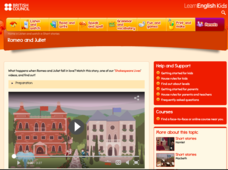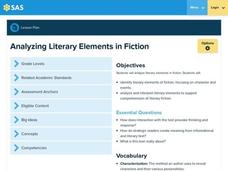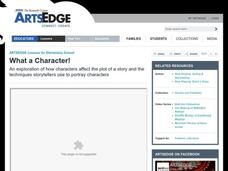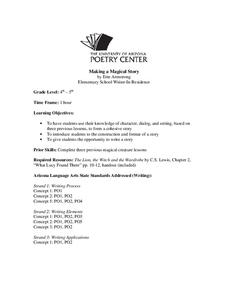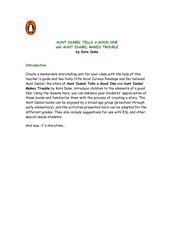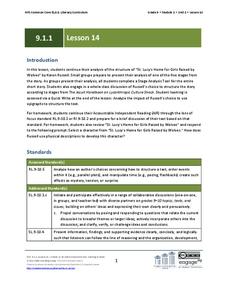E Reading Worksheets
Climax, Structure, and Elements of a Story
Appropriate for any short story, this worksheet asks readers to identify key elements and then analyze the structure of a short story.
Curated OER
Context Clues, Plot Structure, Conflict, and Personal Narrative Essay
What are the elements of a personal narrative? Get your class talking by reading "The Necklace" and "A Dangerous Game." The lesson focuses primarily on defining certain vocabulary terms (like context clues, plot, conflict, climax, etc.)...
Curated OER
The Legend of the Indian Paintbrush
Third graders complete activities for the book The Legend of the Indian Paintbrush, by Tomie dePaola. In this literature lesson, the students read the story and summarize the main events. They look for story elements focusing on the...
Curated OER
Problem/solution
Students examine presentations of problems and reaching solutions in literature. In this writing skills lesson, students read "The Three Little Pigs," and respond to several discussion questions about plot, characters, setting, conflict,...
Curated OER
Create a Story May
First graders review the terms characters, setting and events in stories. They are shown how to access the Kidspiration Map, and how to add pictures in the correct spaces on the map. Students insert pictures in the map of the story...
Digital Education Resource Archive
Narrative Writing Unit
Each one of the learners in your class has a story to tell, so help them learn the most efficient and organized way to tell their tale. A thorough unit on narrative writing addresses the writing process, grammar, story structure,...
British Council
Romeo and Juliet
An engaging video featuring William Shakespeare's Romeo and Juliet is accompanied by six activities designed to reinforce vocabulary, story elements, and comprehension. Scholars match words to pictures, place events in sequential order,...
Pennsylvania Department of Education
Analyzing Literary Elements in Fiction
Students analyze the characters and events in fictional writing. In this literary elements lesson, students study the meaning of the words characterization and fiction. They listen to the story Pigsty by Mark Teague, or any other book...
Curated OER
Read Aloud- Literary Elements- Prediction
First graders read two stories. In this literary elements instructional activity, 1st graders read The Hat by Jan Brett, notice patterns of prediction, identify the setting, problem and solution and compare the story to the book The...
Curated OER
Telling A Story
Students discover that every story has a start, middle and end. In this literature lesson, the teacher models using a picture to show the parts of the story. Students each take a picture and tell a story using start, middle and end.
Curated OER
What a Character!
Students look at the role of characters in a story. For this character lesson, students discuss how different types of characters change the plot of the story. They see how storytellers use their body, face, and voice to tell stories.
Curated OER
Identifying Plot Conflicts
Fifth graders identify plot conflicts in the text. In this plot conflict lesson, 5th graders read Dogs Don't Tell Jokes and recognize examples of character vs. self and character vs. character.
Curated OER
Story Setting - The Art Lesson by Tomi dePaola
Students read the book The Art Lesson by Tomi dePaola and analyze the story. In this setting lesson, students discuss the importance of the setting and how it helps us understand the story. Students answer questions and chart their...
Curated OER
Making a Magical Story
Fourth and fifth graders use their knowledge of developing character, dialogue, and setting to produce an original story. An excerpt from The Lion, The Witch, and The Wardrobe is used as inspiration to get everyone's creative juices...
Curated OER
The "Write" Stuff: Strategies and Conventions for Imaginative Writing
A comprehensive and immersive series of lessons that examines various aspects of story development leads learners into writing a narrative of their own. Writers develop an understanding of the writing process as they use the learning...
Curated OER
Picture-Perfect Story Settings
Using common picture books, teachers can help learners develop the setting for their next creative writing projects.
Curated OER
Literature: Rikki-Tikki-Tavi Character Analysis
Seventh graders read the story "Rikki-Tikki-Tavi" and analyze one of its characters. After completing a story element worksheet, they identify their favorite character. In several sentences students give reasons for their choices with...
Curated OER
Introducing Literary Elements in Fiction
Identify literary elements in fiction. In this reading comprehension lesson plan, learners read the book Pigsty and record literary elements onto a graphic organizer. They specifically discuss the main characters and events in the text.
Curated OER
Story Stew -- Teaching Character, Plot, And Setting
Students examine the story elements of characters, plot, and setting. They identify the story elements from various "ingredients" taken out of a pot, and add their own story element "ingredients" on index cards into the pot.
Australian Centre For the Moving Image
Dreamworks Animation Character Design
Dive into animation creation using Dreamworks® animated films. Compare and contrast characters, wonder and ponder why the plot is so important, and think of background and themes as your creativity unrolls onto paper.
Curriculum Corner
Fairy Tale Unit of Study
What makes a fairy tale a fairy tale? Use a 27-page packet to supplement your next fairy tale unit. With sequencing activities, story map worksheets, character analyses and story elements graphic organizers, and fairy tale highlight...
Curated OER
Mini-Lesson Planning for Inferences
Making inferences and drawing conclusions is a key component to successful active reading. Encourage your class to use context clues and prior knowledge to infer different elements of a story, including the setting, plot, and character...
Curated OER
Aunt Isabel Tells a Good One...
Explore language arts by reading two similar stories in order to compare and contrast them in class. Young readers read two Aunt Isabel books, by Kate Duke, and discuss the main characters, plot, and setting. They complete a graphic...
EngageNY
Grade 9 ELA Module 1, Unit 1, Lesson 14
Karen Russell's short story "St. Lucy's Home for Girls Raised by Wolves" has a unique structure that adds value to the story. With the fourteenth activity in a unit about literary analysis and textual support, analyze how Russell has...








